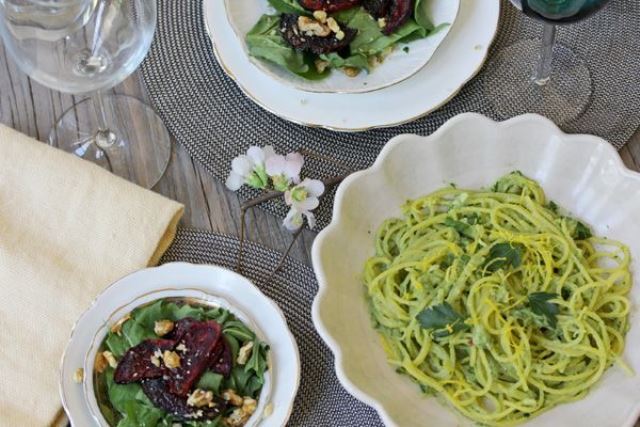Unless you enjoy a full-time stylist and a live-in chef, every single day of your life is going to be bookended with two really important questions: what to wear and what to eat. While the answer to the first usually keeps changing with mood, season, occasion and of course, NLT’s weekly fashion updates in #TrendTalk, you are probably stuck in a rut with your daily diet, getting away with munching on almost the same things all year round. If you aren’t the type who will cheerfully wear the same thing all year, why decorate your platter with the same things for all seasons? If I were to compare the two, your cold green smoothie in the nippy season would be the sartorial equivalent of spending December in a bikini. Get my point?

Image source: Pinterest
It is time that we extend the habit of seasonal rotation in our wardrobes to our diets as well. There was a time when our diets were strictly seasonal- with our digestive systems flushed clean with alkaline leafy greens in spring, our taste buds reveling in a grass-fed barbecued brisket, and smoked, pastured chicken during a sunny summer, and our insides cooled and hydrated with vibrant salads when the temperature took a dip. Now, we stick to a rigid diet all year round, without worrying about swapping the constants with seasonal variables that can prove to be healthier.
Suggested read: I won’t go on a wedding diet because I like the way I look
With seasonal produce being fast replaced by a mechanized, modern framework of producing food- seasonal foods are no longer seasonal. Thanks to a global, industrialized food chain, blueberries are available all year round as are peaches and watermelons. But just because it is easier to avail oranges in winter does not mean we should dig in. The idea, echoed in centuries of wisdom in Ayurvedic food philosophy, evinces that eating seasonally is beneficial to the human body in more ways than one. Our bodies undergo important changes with changing seasons and the consequent imbalances within our system need to be evened out, by specific foods.
Jody Vassallo, an Australian Ayurveda advocate and author of Beautiful Food: Healthy Recipes To Nourish You Inside And Out, says, “A thin, vata type eating a raw diet in winter is a recipe for disaster and a hot, pitta type with a meat-laden paleo diet in summer is just as problematic.” The idea of eating seasonally isn’t a new one. Several other champions of seasonal diets, including Anna Koullourus, Author of I Am Food, have given voice to the same, exhorting more and more people across the globe to “eat food that intuitively makes sense- what your grandma would have cooked, pre-industrialization to sustain life and satisfy appetite and nutritional requirements.”

Image source: Google, copyright-free image under Creative Commons License
Science, too, hasn’t lagged behind in stumbling upon the innumerable benefits of seasonal diets. In a research study conducted by the Ministry of Agriculture, Fisheries and Food in London, England, notable differences were found in the nutrient content of milk in summer vs. that in winter. While the iodine content was higher in the cold season, beta-carotene shot up in summer. These differences were, in turn, induced by the seasonal diets of cows. Similarly, researchers in Japan found a significant difference in the Vitamin C content of spinach grown in summer as opposed to that harvested in winter. The consequent nutritional intake helped researchers infer that seasonal diets are a way of reconnecting with the organic cycle that nature intended for us. The disadvantages of skipping seasonal eating in favor of a tech-induced all-available food practice manifest themselves in a startling rise in incidences of food intolerances, allergies, obesity, modern chronic diseases like type-2 diabetes and more.
Seasonal diets have been given a thumbs up in the literature of TCM aka Traditional Chinese Medicine as well. Karina Stewart, an acupuncture specialist and co-founder of Kamalaya Wellness Sanctuary and Holistic Spa in Thailand points out that the governing principle of seasonal eating is to co-exist in harmony with Nature. She points out that seasonal diets shall make instinctive sense to anybody who is willing to pay heed. Caught up in a fast-paced life that isn’t as good for us as we make it out to be, we forget to switch our diets with the fledgling seasons, thereby subjecting ourselves to the imbalances caused by a rigid diet plan. She enumerates the blatant benefits of consuming cooling foods like cucumbers, sprouts and salads with herbs like mint and pungent spices like chilli, peppers and ginger in summers so that they can help disperse body heat and encourage sweating and keeping the core warm and the metabolism flowing with heart slow-cooked soups and warming drinks spiked with ginger and cinnamon in winters.

Image source: Pinterest
As such, all-year availability of foods that was a boon until a few decades ago is now a cause célèbre. With the spur of food consciousness, more and more people are making a move toward availing organic produce, so as to reap the benefits of taste and nutrient content, at their prime. Organic produce isn’t simply superior in taste, texture and health benefits but also offers a host of advantages in the realms of affordability and environment-friendliness.
“Foods lose flavor just as they lose moisture when they are held. Fresh, locally harvested foods have their full, whole flavors intact, which they release to us when we eat them,” explains Susan Herrmann Loomis, owner of On Rue Tatin Cooking School in France and author of numerous cookbooks. “Foods that are chilled and shipped lose flavor at every step of the way — chilling cuts their flavor, transport cuts their flavor, being held in warehouses cuts their flavor.”
Brian Halweil, author of Eat Here: Homegrown Pleasures in a Global Supermarket says,
“If you harvest something early so that it can endure a long distance shipping experience, it’s not going to have the full complement of nutrients it might have had.”
Organic produce is arguably better, not just for health, but for the environment as it is less likely to have been refrigerated, shipped or sprayed for months.
Suggested read: 9 happy tips to avoid holiday weight gain
Publishing phenomenon Donna Hay concurs, “People are so much more conscious these days. And the produce that’s in season is the most vibrant.” Flavoring her own eponymous magazine with strong seasonal themes, she believes that the luxe movement in health is finally catching on, with more and more people seeking out recipes that not only taste great but are intrinsically good as well. We are iffy about the dual delight as well. After all, eating seasonally means eating what’s best! And there’s no way you can top that!
Featured image source: Pinterest













